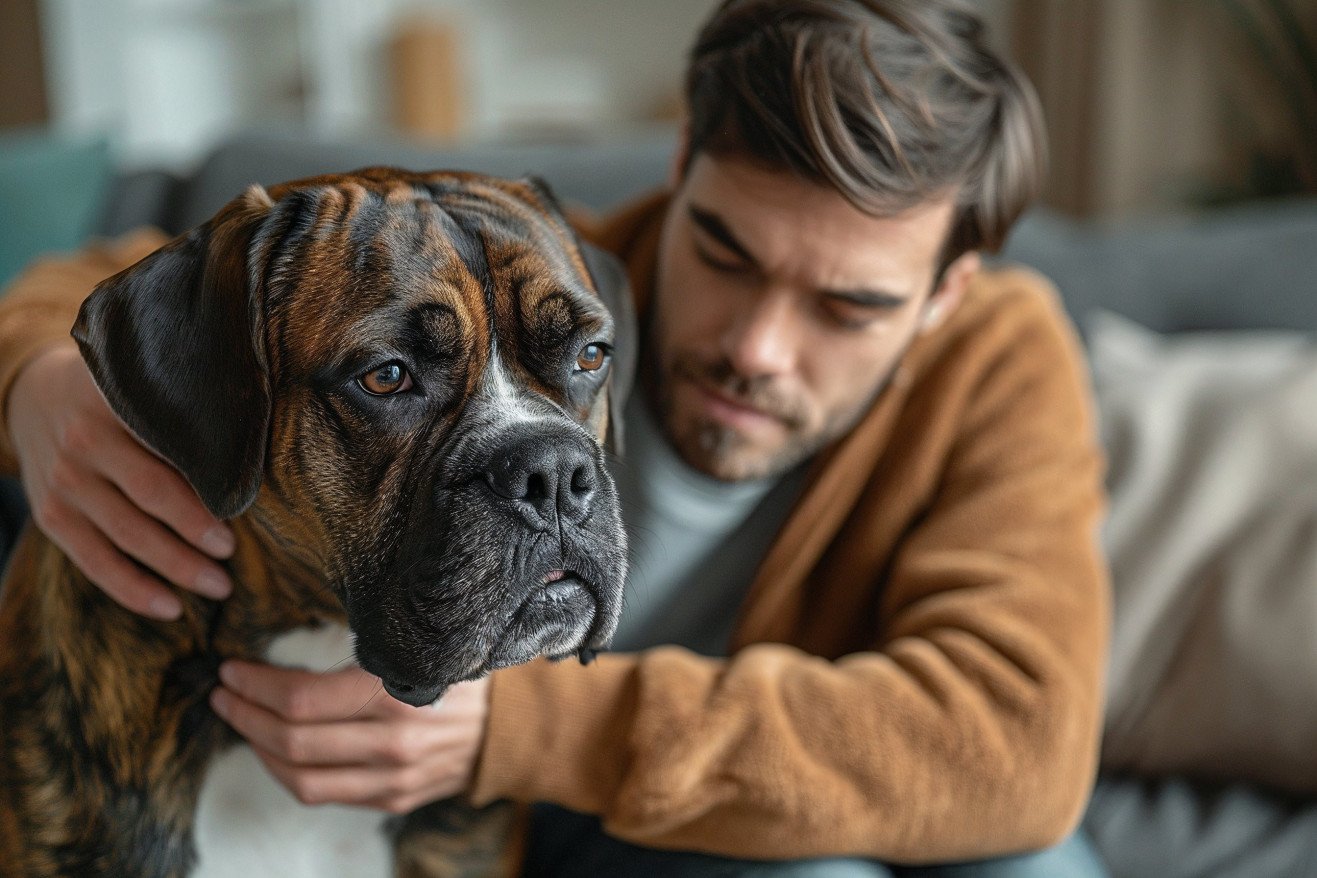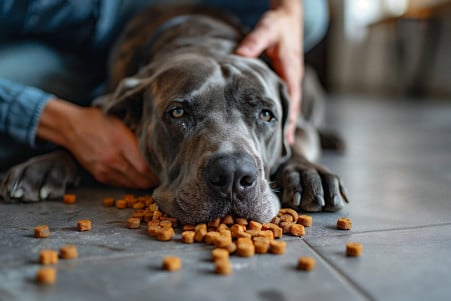Dog Dry Heaving but Acting Normal? What It Could Mean and When to Be Concerned
1 February 2024

Is your dog dry heaving but acting normal? It could be nothing, or it could be a sign of a more serious issue; how can you tell the difference? Dogs can dry heave on occasion due to things like mild stomach upset or even excitement.
That said, if your dog is dry heaving often or if they’re dry heaving and experiencing other symptoms like bloating or pain, it could be a sign of a serious issue like gastric dilation-volvulus (GDV), which is a medical emergency that requires immediate veterinary care.
To help you figure out why your dog is dry heaving from time to time, we’ve combed through research from veterinary medicine, animal physiology, and the behavioral sciences.
We’ve taken what we’ve learned from these studies and used it to help us determine what might be going on and how to tell when certain symptoms are indicative of a medical emergency.
By the time you’re done reading, you’ll know how to tell when your dog’s dry heaving is nothing to worry about and when it’s a sign that they need to go to the vet right away, which will help you ensure that your dog stays as healthy as possible.
What could be the most likely cause for a dog that is dry heaving but acting normal?
Warning Signs: When Dry Heaving Is a Symptom of a More Serious Issue
In some cases, a dog’s dry heaving, or retching without bringing anything up, is a sign of a more serious health condition that needs to be addressed right away. One of the most serious issues is gastric dilation-volvulus (GDV), commonly known as “bloat.”
This condition, as defined by A-Z Animals and Great Pet Care, occurs when a dog’s stomach fills with gas and sometimes twists, causing a loss of blood supply and leading to rapid deterioration and death if not treated immediately. Other symptoms that come with GDV include a distended belly, difficulty breathing, and obvious discomfort.
In addition to GDV, Memphis Veterinary Specialists lists other serious causes, including esophageal foreign bodies, and respiratory issues like kennel cough, which can cause a dog to cough violently and then dry heave. In addition, tonsillitis or growths in the throat can cause dry heaving and require veterinary care.
It’s important to know what other symptoms to look for. If a dog has symptoms of GDV or seems to be in pain due to a respiratory or throat issue, it’s important to get them to a vet right away. Catching these issues early can lead to much better outcomes. Knowing the symptoms and acting quickly can be the difference in these cases.
Solving the Puzzle: How Dry Heaving in Dogs Is Diagnosed
Veterinarians will first perform a comprehensive physical exam to check for any signs of pain or discomfort that could indicate a more serious condition, such as gastric dilation–volvulus (GDV).
According to NorthJersey.com, the veterinarians at Oradell Animal Hospital often take radiographs (X-rays) to check for any twisting of the stomach or foreign objects that could be causing a blockage. Blood work is also typically done to check for overall health and to rule in or out specific conditions.
These tests are important because they help veterinarians differentiate between life-threatening conditions like GDV and more minor causes like indigestion or a food sensitivity. Pet parents can help by providing a thorough history of their pet’s health and behavior, which can help the vet put together the pieces of the puzzle.
While important, these tests can be expensive and time-consuming. However, it’s important to get a correct diagnosis so that the underlying cause of the dry heaving can be treated and the dog can get the care they need.
How to Get Help for Your Dog’s Dry Heaving
The treatment for dry heaving in dogs can be as varied as the causes. For example, if your dog has kennel cough, which is a common cause of dry heaving, your vet may prescribe anti-inflammatory medications or oral antibiotics, according to Great Pet Care. While these treatments may not be an emergency, they are important to help your dog feel better and to keep the condition from getting worse.
On the other hand, if your dog has gastric dilation-volvulus (GDV or bloat), which is characterized by a swollen abdomen and restlessness, immediate surgery is necessary. GDV is typically treated with emergency surgery, specifically a gastropexy, which secures the stomach to prevent future episodes of twisting—a procedure that can save the lives of dogs with GDV, notes Great Pet Care.
Follow-up care is also important to make sure your dog makes a full recovery and to help prevent the condition from coming back. This can include watching your dog’s behavior after treatment and making sure to follow any dietary or medication instructions.
If your dog has surgery, you may also need to make sure to manage your dog’s pain at home, watch the incision site, and make sure to gradually increase your dog’s activity level as directed by your vet.
Cost is also a factor to consider, especially since pet insurance can help cover some of the costs associated with these treatments, according to Spot Pet Insurance. It’s also important to note that every dog is different, so it’s important to make sure to stay in touch with your vet to make sure your dog is as healthy as possible.
Recognizing the Emotional Causes of Dry Heaving in Dogs
Dogs can’t tell us when they’re feeling sick, so it’s important to pay attention to even the smallest changes in their behavior. According to AKC Pet Insurance, changes in behavior like increased restlessness or irritability can be a sign that something is wrong.
Dry heaving can also be a sign of stress or anxiety. Since dogs can’t talk, they communicate through their behavior, so it’s important to keep an eye out for any changes in their behavior that could indicate a problem.
As Wag! explains, stress can cause physical symptoms like vomiting, and the same goes for dry heaving. Dogs can become stressed by changes in their environment, conflicts with other dogs, and scary situations.
It’s important to keep a stable environment and routine to avoid stress-related dry heaving and ensure a dog’s overall well-being. To help reduce stress in dogs, professionals recommend regular exercise, spending time with their owners, and keeping a consistent schedule.
In addition, the Fi Team recommends regular vet visits and building a strong bond with your dog to help you catch and prevent health issues, including those caused by stress. By recognizing and meeting our dogs’ emotional and psychological needs, we can help make sure they’re healthy and happy.
Understanding the Physiology of Dry Heaving in Dogs
When dogs dry heave, they are going through a specific gastrointestinal process that is similar to vomiting but does not result in the expulsion of stomach contents.
According to a study in ScienceDirect, dry heaving is caused by a peristaltic sequence that moves through the gastrointestinal tract, which is different from vomiting in that it does not result in the expulsion of stomach contents. This retrograde peristalsis—a backwards wave of muscle contractions—does not result in the content being brought up, leading to dry heaving instead of productive vomiting.
For dog owners, it is important to understand the difference between dry heaving and vomiting. Vomiting is a protective reflex that empties the stomach, but dry heaving is the reflex without the action and can be caused by a variety of things, including stress, irritants, or medical conditions.
According to Digestive Diseases and Sciences, a number of physiological processes, including myoelectric activity and dopamine receptor activation, are involved in the process of dry heaving, indicating that both central and peripheral physiological processes are at play.
Understanding the physiological processes that lead to dry heaving can help dog owners better understand their pet’s symptoms and know when to seek help from a veterinarian. However, recognizing these symptoms is not just about knowing when to be concerned—it’s also about having a deeper understanding of your pet’s health and being able to take informed action.
Final Thoughts: What Does It Mean When Your Dog Keeps Dry Heaving?
As we’ve discussed, there are a number of reasons why your dog may be dry heaving, ranging from relatively minor issues like an upset stomach to more serious problems like gastric dilation-volvulus (GDV), respiratory problems, or an obstruction. The most important thing to consider is the context of the situation and how often it’s happening. This will help you determine if it’s a minor issue or a medical emergency.
We always recommend that pet parents trust their gut, keep a close eye on their dog, and reach out to a vet if they feel like something isn’t right. That said, while the occasional dry heaving episode may not be cause for concern, if it’s happening frequently or if it’s happening in conjunction with other symptoms like a distended abdomen or signs of pain, it’s time to take your dog to the vet.
Preventative care, including regular vet visits, is important for catching any issues early and keeping your dog as healthy as possible. With this information, you’ll be better prepared to help your dog stay healthy, know when to seek medical attention, and make sure your dog is as happy and healthy as possible. This combination of vigilance and knowledge is the key to a long, happy life with your furry friend.


